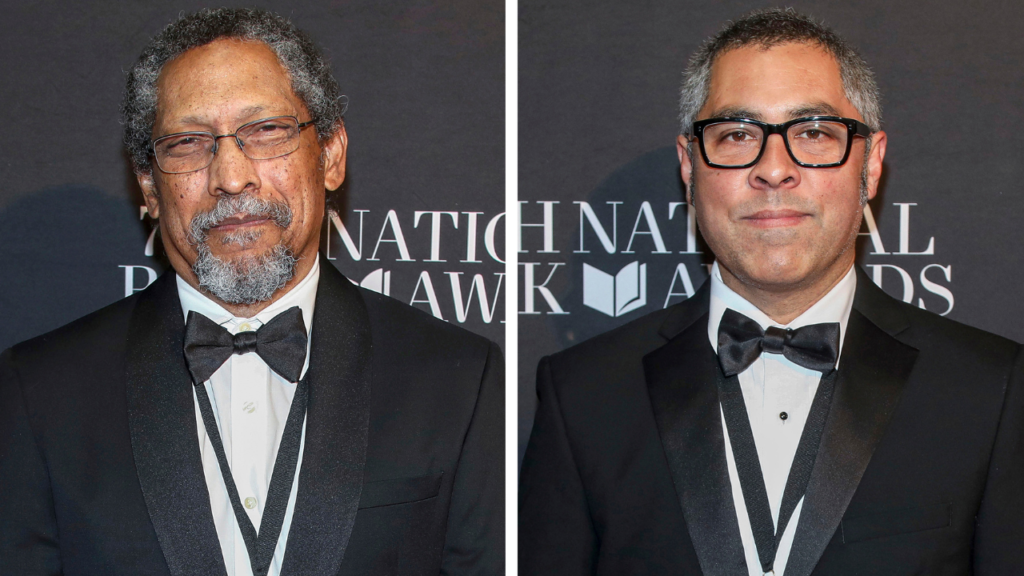In a remarkable celebration of literary excellence, Percival Everett’s novel “James” took home the prestigious National Book Award for fiction, marking a significant achievement in the author’s career. This innovative retelling of “The Adventures of Huckleberry Finn” is narrated from the perspective of Jim, the enslaved character in Mark Twain’s original work. By shifting the narrative lens, Everett offers readers a fresh understanding of Jim’s experiences, which serve to highlight the layered complexities of race, identity, and resilience within the American historical context.
Jason De León’s nonfiction work, “Soldiers and Kings: Survival and Hope in the World of Human Smuggling,” also garnered acclaim, winning the nonfiction category. Among the finalists was Salman Rushdie’s poignant memoir, “Knife,” documenting the aftermath of his harrowing stabbing in 2022. This year’s award ceremony, which took place amid a backdrop of over 1,900 nominations, presented a unique array of literary voices recognized through panels composed of esteemed writers, critics, and booksellers.
In the young people’s literature category, Shifa Saltagi Safadi’s coming-of-age narrative, “Kareem Between,” was lauded, while Lena Khalaf Tuffaha’s poetry collection, “Something About Living,” received the poetry award. The award for translation was presented to Yáng Shuāng-zǐ’s “Taiwan Travelogue,” with Lin King responsible for the Mandarin translation. This rich tapestry of categories highlights the diversity of contemporary literature and the importance of representing various experiences and perspectives.
As a testament to the strength of Everett’s voice, he has risen from relative obscurity in prior decades to being recognized as a finalist for the Booker Prize and the Pulitzer Prize for novels including “Trees” and “Dr. No.” His recent win with “James” further solidifies his place in literary circles, coupled with the recognition that “Erasure” garnered when adapted into the Oscar-nominated film “American Fiction.” During his acceptance speech, Everett expressed gratitude for the warm reception of “James,” affirming the power of narrative to influence and inspire.
The ceremony also honored notable achievements beyond the competitive categories, with Barbara Kingsolver and Black Classic Press publisher W. Paul Coates receiving lifetime achievement medals, underscoring their long-term contributions to the literary landscape. The speakers throughout the evening emphasized themes of diversity, autonomy, and social justice, with specific emphasis on the ongoing humanitarian crisis related to the Gaza conflict. Both Safadi and Tuffaha conveyed passionate calls for awareness and support for Palestinians, reflecting the intersecting realities of art and activism.
Tuffaha, in particular, dedicated her award to the memory of those lost within the Palestinian context, a poignant acknowledgment of the struggle that informs her work. Last year, there was notable backlash against the awards due to concerns raised over statements related to the Gaza war, further complicating the intersection of literature and political discourse within the publishing world.
National Book Foundation’s Executive Director, Ruth Dickey, addressed these complexities by reiterating the organization’s commitment to free expression while denouncing anti-Semitism and other forms of discrimination. This recognition of the nuanced nature of literary discourse is crucial in maintaining a platform where diverse voices can be amplified and heard, even amid polarizing sentiments.
As the National Book Awards celebrated its 75th anniversary, the mood at Cipriani Wall Street was uniquely reflective. The evening featured host Kate McKinnon, who embraced humor amid the prevailing tension of current events, making light of the state of the world while still honoring the literary accomplishments celebrated that night. The musical interlude led by Jon Batiste served as a wholesome reminder of communal joy, despite the tumult present in broader society.
In closing the evening, Kingsolver articulated a sentiment resonating with many in attendance; the act of creating literature allows for the imagining of “better endings” in an often tumultuous world. Percival Everett’s reflections from the awards were not merely about literary success but tapped into a collective need for hope and mutual support during challenging times. With a vivid reminder that the absurd and surreal can often connect deeply to artistic expression, Everett encapsulated the essential role of literature as both a refuge and a catalyst for conversation.



